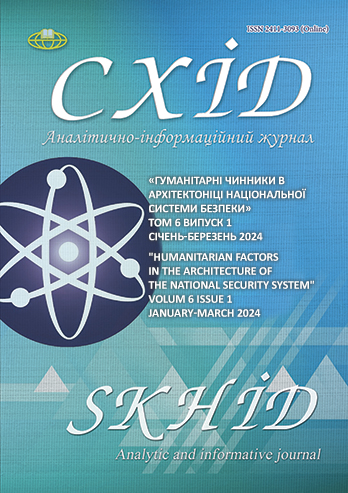Trapped values of education and threat to national security in temporarily occupied territories of Ukraine
DOI:
https://doi.org/10.21847/2411-3093.2024.612Keywords:
collaborationism, occupation regime, higher education, educational transformative occupation, educators’ collaborationism, SDGsAbstract
The strong democratic nations tend to follow UN sustainable development goals (SDGs) while weak states choose the way of war for immediate self-affirmation. This destructive way is an insurmountable obstacle for SDGs tracking as a whole and primarily in the educational sector.
Despite the influence of “the Fair War Theory”, the war is perceived as a source of destructive aggression, deaths, destructions, violence and moral degradation. Any war is aimed at the occupation of territories when the occupation regime uses vari-ous instruments and the collaborationism is the most widespread. Within the scope of this article the educational collaborationism is subject to a special analysis as it plays one of the major roles in creating an effective occupation system. We do not aim at providing the comprehensive consideration and interpretation of the phenom-enon of “Educators’ Collaborationism”, as well as the identification and detailed ex-planation of the entire spectrum of its destructive consequences. The purpose is to articulate the mentioned phenomenon within the problem of using education as a tool of occupation and threat to the national security of the occupied state. The methodological design of the study is based on a situational approach, which em-phasizes the importance of considering a number of factors influencing the changes in the educational process during the occupation, as well as the identification of situational variables that affect the level of access to higher education (HE), its quali-ty and content on the occupied territories. The method of qualitative case-study re-search made it possible to formulate certain generalizations about this phenomenon and its effect on HE in particular.
It was found out that in the temporarily occupied territories education is used as a tool to strengthen and legitimize the occupation regime. Among the key agents there are also the occupiers’ assistants from the educational sector. The analysis of spe-cific situations gives reason to claim that the conscious, voluntary cooperation of educators with the enemy provokes the erosion of the ethical principles of educa-tion, its degradation and blocks the SDGs accomplishing. Such activity has negative consequences as it aggressively denies managerial autonomy, the right for academ-ic freedom and other components of quality HE and other SDGs as they all are inter-linked.
Unfortunately, we are to admit that the educational transformative occupation causes total paralysis and even erosion of the national education system in the tem-porarily occupied Ukrainian territories. Therefore, the consequences of the implemen-tation of educational transformative occupation should determine the directions of the processes of de-occupied territories education restauration.
Downloads
References
Arqoub, Omar Ahmad Abu, Özad, Bahire Efe, Elega, Bergan, S., Noorda, S., Egron-Polak, E. (2020). Academic freedom and institutional autonomy – What role in and for the EHEA? (pp. 41-55). In: Academic freedom, institutional autonomy and the future of democracy. Council of Europe Higher Education Series, No. 24., Retrieved from https://rm.coe.int/prems-025620-eng-2508-higher-education-series-no-24/1680a19fdf
CESCR General Comment No. 13: The Right to Education (Art. 13) Adopted at the Twenty-first Session of the Committee on Economic, Social and Cultural Rights, on 8 December 1999 (Contained in Document E/C.12/1999/10). Retrieved from https://www.refworld.org/pdfid/4538838c22.pdf
Darcy, S. (2019). Coming to Terms with Wartime Collaboration: Post-Conflict Processes & Legal Challenges. Brooklyn Journal of International Law, 45(1), Article 2. Retrieved from https://brooklynworks.brooklaw.edu/bjil/vol45/iss1/2
Desiderius Erasmus (2004). The Complaint of Peace. New York, 84 p.
Ferraro, T. (ed.) (2012). Occupation and Other Forms of Administration of Foreign Territory. Geneva. 147 p. Retrieved from https://www.icrc.org/en/doc/assets/-files/publications/icrc-002-4094.pdf
Kaldor, M. (2013). In Defence of New Wars, Stability. International Journal of Security & Development, 2/(1), 1-16. https://doi.org/10.5334/sta.at
Potapova, V. (2022). “Shist’ +” seriosnykh porushen’ proty ditei: vyklyky ta naslidky rosiisko-ukraiinskoii viiny 2022. [“ Six+ “ serious violations against children: challenges and results of Russian-Ukrainian war 2022]. Retrieved from https://hrhcrimea.org.ua/analitychnyj-oglyad-shist-serjoznyh-porushen-proty-ditej-vyklyky-ta-naslidky-9-misyacziv-rosijsko-ukrayinskoyi-vijny-2022 /
Soto, J. (2001). The Application of Education Rights in the Occupied Territories. Florida Journal of International Law, 13(2), Article 3. Retrieved from https://scholarship.law.ufl.edu/fjil/vol13/iss2/3
Sustainable Development Goals: Ukraine. National Baseline Report (2017). Retrieved from https://ukraine.un.org/sites/default/files/2020-06/SDGs_NationalReportEN_Web.pd f
Ukraine: childrenʼs education is one more casualty of Russian aggression: Amnesty International Research Briefing (2023). Retrieved from https://www.amnesty.org/en/documents/eur50/7508/2023/en/
Downloads
Published
How to Cite
Issue
Section
License
Copyright (c) 2024 Вікторія Пугач, Тетяна Костюк

This work is licensed under a Creative Commons Attribution-NonCommercial-NoDerivatives 4.0 International License.
1. Authors bear responsibility for the accuracy of facts, quotations, numbers and names used.
2. Manuscripts are not sent back.
3. The publisher does not always agree with the authors' opinion.
4. The authors reserve the right to authorship of the work and pass the first publication right of this work to the journal under the terms of a Creative Commons Attribution-NonCommercial-NoDerivatives 4.0 International License. This license allows others to distribute (copy) the published work for non-commercial purposes, provided there is mandatory attribution to its authors and a link to the first publication in our journal.
5. The authors have the right to conclude separate supplement agreements that relate to non-exclusive work distribution in the form in which it has been published by the journal (for example, to upload the work to the online storage of the journal or publish it as part of a monograph), provided that the reference to the first publication of the work in this journal is included.

